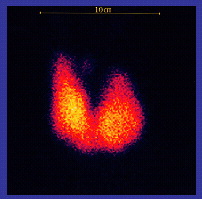The conflict which was a solution
The starting point for one of the most important changes in my life began on a sunny day in March. I was dressed in t-shirt & shorts, despite the bitter wind, that was typical for the time of year. Internally, my body was mimicking the sticky warmth of a hot summer’s day.
I was in my mid-twenties and on placement as a trainee pharmacist. After years of studying, I was finally able to put theory into practice, interacting with real people in a pharmacy. It was a phase of high activity and seething energy.
The turning point
Unbeknown to me, a customer had observed my slight hand tremors and informed my manager. She/He, in turn, arranged a consultation, at short notice with a renowned chief physician . I was instructed to attend the doctor’s appointment the next morning.
 The diagnosis was crystal clear: Graves’ disease (also called Basedow syndrome) – a common form of hyperthyroidism. My whole thyroid was enlarged due to hyperplasia. My thyroid hormone levels – T3 and T4 – were abnormally high and my Thyroid Stimulating Hormone (TSH) level was abnormally low. My pulse rate was as high as 120 / min in calm situations. The doctor wanted to admit me into hospital there and then. I refused because hospitals make me feel sick. So I was given a prescription for antithyroid agents and beta-blockers as my primary therapy, as well as the attestation that I was unfit for work. My boss – the very person who’d sent me to see the doctor – wasn’t amused and sacked me on the spot, a few days before my training period was due to end.
The diagnosis was crystal clear: Graves’ disease (also called Basedow syndrome) – a common form of hyperthyroidism. My whole thyroid was enlarged due to hyperplasia. My thyroid hormone levels – T3 and T4 – were abnormally high and my Thyroid Stimulating Hormone (TSH) level was abnormally low. My pulse rate was as high as 120 / min in calm situations. The doctor wanted to admit me into hospital there and then. I refused because hospitals make me feel sick. So I was given a prescription for antithyroid agents and beta-blockers as my primary therapy, as well as the attestation that I was unfit for work. My boss – the very person who’d sent me to see the doctor – wasn’t amused and sacked me on the spot, a few days before my training period was due to end.
As I left the pharmacy for the last time, I felt an overwhelming sense of freedom.
Admittedly, life had thrown me a curveball, but it was also an opportunity to start afresh. I put the hyperactivity caused by my thyroid disorder, to good use. On the same day I’d refused a hospital admission and was sacked from my job, I’d visited both the city hall, to apply for housing benefit, and the employment office for sickness benefits. By evening time, I was satisfied that my financial needs were taken care of, at least in the short-term. Now I could focus my energies on taking care of myself.
Researching the cause
Over the next few days, I visited my university’s library to learn more about overactive thyroid disease. Here’s what I found:
- Graves’ disease is a collection of diffuse symptoms and is generally considered to be an autoimmune disease.
- The disorder results from an antibody (called Thyroid Stimulating Immunoglobulin or TSI) that has a similar effect to the regular Thyroid Stimulating Hormone (TSH) – a hormone made in the pituitary gland.
- The TSI antibodies cause the thyroid gland to produce excess thyroid hormone.
- The result is a negative feedback to the pituitary gland, lowering the production of TSH.
The process itself is quite easy to describe, but the causes are mostly unknown. A combination of genetic predisposition to the disease and environmental factors are believed to lie at the root of the disorder.
Accordingly, current treatment options are generic:
- Surgery
- therapy with radioactive iodine and, or
- antithyroid medication.
Both surgery and radioiodine therapy usually result in too low thyroid activity (hypothyroidism) – with negative impact to quality of life.
Antithyroid medication can effectuate a state of euthyreosis, but the mechanisms of action are not completely understood.
I left the library feeling deeply dissatisfied and took the next ferry to wander along the beach. When back home my personal approach was clear:
Don’t fight with the rebels inside, try to communicate with them!
The power of being attentive
 As my daily duties were minimized I started to live as I liked and to observe my body’s feedback. Soon the cause for my disorder became obvious: The first employment relationship of my practical training period as pharmacist had lasted only one month because of a hierarchical conflict. The second pharmacy had been literally my last choice. And for the second half of the practice I would have been obliged to work “underground” in the dispensary – mass producing unguents for the University Medical Center of Dermatology. I would never have been fast enough to fulfill a job like this.
As my daily duties were minimized I started to live as I liked and to observe my body’s feedback. Soon the cause for my disorder became obvious: The first employment relationship of my practical training period as pharmacist had lasted only one month because of a hierarchical conflict. The second pharmacy had been literally my last choice. And for the second half of the practice I would have been obliged to work “underground” in the dispensary – mass producing unguents for the University Medical Center of Dermatology. I would never have been fast enough to fulfill a job like this.
When understanding this, I felt gratitude for the rebels inside me, giving me such an amazing exit strategy!
Back to personal balance
I no longer worked in fast-paced environments, so the need to produce lots of energy was redundant.
From a scientific point of view the medication with antithyroids was the only acceptable therapy, but the challenge was finding the euthyreotic state. I started searching for a complementary approach to balance the process. I’d previously had good experiences with classical homeopathy, so upon studying the constitutional remedies, I discovered that Iodum D30 was the best match for my situation.
As my blood levels were controlled every other week, I saw no risk to take over the helm – to steer my recovery myself. In the second month I began to reduce the dosage of the antithyroids. By the third month I was down to zero. Balancing my thyroid with Iodum combined with attentiveness to feedback from my body’s own intelligence was a really successful approach. The levels of T3, T4 and TSH in my blood were normal again, and stable!
Learning more about myself
Meanwhile my inner learning process continued. I found that studying pharmacy had not been the best way for me. In fact, pharmacy had only been a compromise solution for economic reasons. But I understood that completing my practical training period would give me a much higher value: freedom!
In the summer I found another pharmacy to continue my practice. Luckily, it was the pharmacy that always had been my favorite. And the boss was a fan of homeopathy.
Still I found that I disliked the drabness of 9 to 5 jobs. After my official approbation as pharmacist I decided to start studying oceanography beside freelancing in public pharmacies.
To be honest, my overactive thyroid had a nice side effect: I was certified unfit for military service. Having an intense aversion to hierarchy, I was pleased not to have the sword of Damocles hanging over me..
I do it my way
Nearly three decades have gone since this important life change. My tendency to react with the thyroid will probably stay with me for the rest of my life. But I don’t need to take any medication. Meanwhile I realize that it’s a fantastic early warning system – helping me to find my way and my rhythm.
If you were to ask me as a person affected by thyroidism, for some advice, here’s what I’d share:
- You are a unique person. Accept yourself as you are.
- See your limits. Limits are no faults.
- Relax in order to observe the situation. Are there any solutions you didn’t see before?
- Enjoy your life! It’s the only one you’ve got.

The META-Health view
Thyroid hormones speed up the heart frequency, increase blood pressure, dilate blood vessels in the extremities, as well as increasing energy supply and metabolism, so that body temperature rises. Nerves are excitable and highly reactive. Thyrocytes are stimulated by TSH from the pituitary.
The conflict theme is generally the inability to reach or rid oneself of a chunk / aim because of not being fast enough:
- “My pace doesn´t fill the needs.”
- “I’m not effective enough!”
The conflict triggers the functional increase by hyperplasia of the affected cells to improve the person’s agility and quickness – in accordance to the Brain Stem concept.
More details about the thyroid in the META-Wiki – accessable in the MHI members’ portal.
Study the methodology of healing!
Image sources:
[1] User MBq via Wikimedia Commons https://en.wikipedia.org/wiki/File:Basedow-vor-nach-RIT.jpg
[2] https://pixabay.com/de/hamsterrad-laufrad-job-kreis-1014047/
[3] Kora Klapp
 META-Healthy Life articles are created by professionals and friends of META-Health International CIC, supporting individual and global health by deepening and sharing our understanding of how resilience and well-being are achieved.
META-Healthy Life articles are created by professionals and friends of META-Health International CIC, supporting individual and global health by deepening and sharing our understanding of how resilience and well-being are achieved.